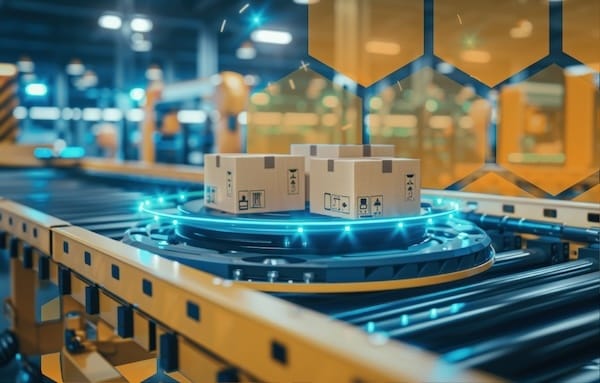- Warehouse Wisdom. Weekly.
- Posts
- Warehouse Wisdom. Weekly. 01/17/2025
Warehouse Wisdom. Weekly. 01/17/2025
Only the most relevant news for SMBs to improve logistics – picked, packed, and delivered without the bias.

Happy Friday!
It’s been a tough week for donut enthusiasts in Nebraska, New Mexico, and other states, as supply chain issues hit where it hurts—right in the glaze. Dunkin’ locations across the U.S. found themselves running out of stock due to a manufacturing error, proving once again that logistics can crumble even the most dependable breakfast traditions. While the coffee kept flowing, as well as “Munchkin,” the absence of donuts left many pondering the true meaning of supply chain resilience (or lack thereof).
And there’s lots more to cover in warehousing and logistics the past seven days. In this week’s newsletter, we’ll cover the brand new External Revenue Service, Mexico’s moves to work with its North American neighbors, California’s surprising pause on emission regulations, the rise of smart shopping carts in retail, and more. Let’s dive in!
Global Freight and Shipping
Birth of the External Revenue Service, Red Sea caution, and warming relations with Mexico

Maersk and Hapag-Lloyd have collectively decided that the Red Sea is not worth revisiting for now, despite the inroads being made with peace treaties in the region. Shippers are continuing to take the scenic route, preferring stability over chaos until things improve further.
Just when you thought bureaucracy had reached its peak, enter the External Revenue Service. This newly proposed agency would focus on collecting tariff revenues, sparing the IRS from additional headaches. Critics argue it’s just a reshuffling of responsibilities, but hey, what’s logistics without a little regulatory drama? If nothing else, the ERS could give us a fresh acronym to toss around in meetings.
With the new administration settling in, the first 100 days are shaping up to be a logistics whirlwind. From discussions of a “shipping czar” to complex maritime power plays, the landscape is as clear as a foggy harbor. If you thought 2024 was complicated, buckle up—2025 promises even more regulatory twists and global trade tensions to track. Don’t worry; we’ll keep an eye on the chaos for you.
To reduce reliance on China, Mexico is rolling out nearshoring incentives aimed at strengthening partnerships with the U.S. and Canada. It’s a savvy move that aligns with North American supply chain goals. Whether this strategy is a win-win or just another complicated dance in the global logistics tango remains to be seen. For now, the focus is on collaboration—something the industry could always use more of.
Meanwhile, Canada is gearing up for possible retaliation, preparing levies on U.S. goods in case tariffs are implemented. It’s the kind of passive-aggressive move that makes trade relationships so exciting. While this might feel like déjà vu for those who survived the last tariff wars, the stakes are higher with supply chains still recovering from pandemic-era disruptions. Let’s hope cooler heads (and fewer tariffs) prevail.
Hire Ava, the Industry-Leading AI BDR
Your BDR team is wasting time on things AI can automate. Our AI BDR Ava automates your entire outbound demand generation so you can get leads delivered to your inbox on autopilot.
She operates within the Artisan platform, which consolidates every tool you need for outbound:
300M+ High-Quality B2B Prospects, including E-Commerce and Local Business Leads
Automated Lead Enrichment With 10+ Data Sources
Full Email Deliverability Management
Multi-Channel Outreach Across Email & LinkedIn
Human-Level Personalization
U.S. Shipping
California takes two steps back on zero-emission measures

California’s once unyielding push for zero-emission locomotives has officially hit the brakes. After years of ambitious rhetoric, regulators have decided to pull back, leaving advocates wondering if the golden state is losing its green luster. Perhaps someone reminded them that upgrading an entire fleet of locomotives isn’t exactly an overnight project—or a budget-friendly one.
Speaking of California, the state is also reconsidering its mandates for zero-emission trucks. The withdrawal of CARB’s Advanced Clean Fleets waiver request signals a shift in strategy, though it’s unclear whether this is a temporary pause or a sign of bigger compromises to come. Either way, fleet owners across the state are likely breathing a sigh of relief, knowing they’ve bought themselves a bit more time to figure out how to turn diesel dreams into electric realities.
On the private-sector front, Veho is shaking things up with its new Premium Economy delivery service. Aimed squarely at competing with USPS, this offering promises faster shipping times at a price point that doesn’t make your CFO cry. Veho is betting big on consumer demand for speed and convenience.
Not to be outdone, USPS announced its upcoming Next Day Priority shipping service, set to launch in 2025. It’s a bold move for the postal giant, but one that reflects the industry’s relentless march toward instant gratification. While we’ll wait to see how this shakes out operationally, it’s clear that USPS is done playing defense and ready to take on its private competitors head-on. It’s anyone’s guess who will win, but one thing’s certain—consumers are enjoying the perks of this delivery arms race.
Logistics Vitals
China races to beat the tariffs

China's exporters scrambled to ship goods ahead of anticipated U.S. tariffs, leading to a surge in December exports. The looming trade barriers drove a year-end rush to beat the clock, highlighting the continued volatility in U.S.-China trade relations. Key data points include:
December 2024 exports from China increased by 10.7% year-over-year, signaling a significant end-of-year surge.
Exports to the U.S. specifically rose by 15.6% in December, reflecting fears of imminent tariff impacts.
Exports to the EU jumped 8.8%.
China’s overall trade surplus for December reached $104.84 billion, despite ongoing global economic uncertainties.
Warehouse Tech
Instagram rolls out smart shopping carts

Instacart is rolling out its "smart carts" to grocery stores across North America, promising to revolutionize the shopping experience—or at least make you hyper-aware of your spending habits. Equipped with sensors, screens, and enough tech to rival a spaceship, these carts can weigh your produce, scan items, and even suggest what else you might "need." It's a win for efficiency but a potential loss for last minute impulse buys.
UPS has invested heavily in warehouse automation, but the human cost is beginning to show. The company’s nationwide rollout of automation technology has led to layoffs across its facilities, as robots continue to outshine humans in both efficiency and cost.
Marketplaces
TikTok’s last minute hope for U.S. continuation

Breaking: the Supreme Court upheld the law that could potentially lead to the end of TikTok in the US. Now, the new administration might be the only hope for survival. Reports suggest that a potential executive order could reverse the previous veto on the platform, signaling a shift in the U.S.-China tech standoff. Perhaps this offers some last minute hope?
In response to changes in shopping behaviors, even Burlington is rethinking its retail strategy, opting for smaller store formats to adapt to shifting consumer preferences. The chain is leaning into efficiency, cutting back on sprawling locations in favor of compact, streamlined shopping experiences. It's a bold move for a brand that built its identity on “coat megastores,” but hey, if downsizing is the future of retail, Burlington is zipping up and getting with the program.
Amazon added a staggering one million new sellers to its platform in 2024, proving once again that e-commerce is the gift that keeps on giving (at least for Jeff Bezos). With new merchants flooding the marketplace, most end up failing within the first year, and a hefty percentage of total sales is still owned by longer-term sellers.
Warehouse Quick Deliveries
Pandemic overcharges, oil rate spikes, Joann’s sequel bankruptcy, and more…
Crate & Barrel claims retailers paid $30 million more in charges that they should have during the pandemic.
Joann files for second bankruptcy.
DHL Supply Chain to acquire Inmar to boost returns processing.
“This unachievable mandate would have raised costs and caused disruption throughout our supply chain without delivering the promised environmental benefits.”

